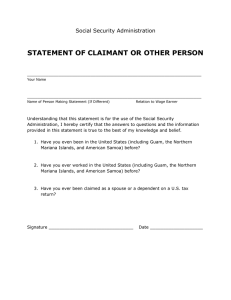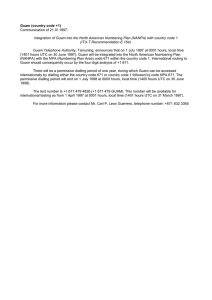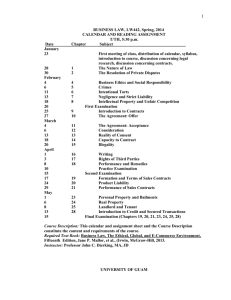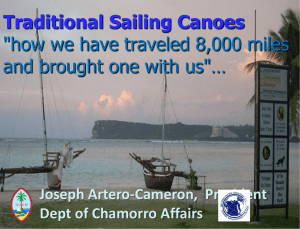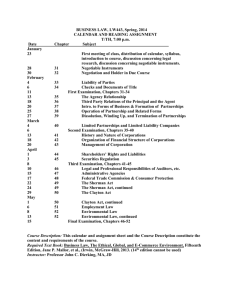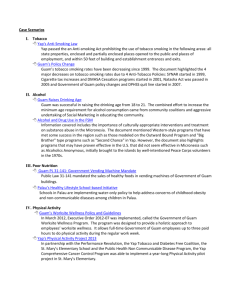Ninth Circuit Affirms “Absurd” Denial of Insurance
advertisement
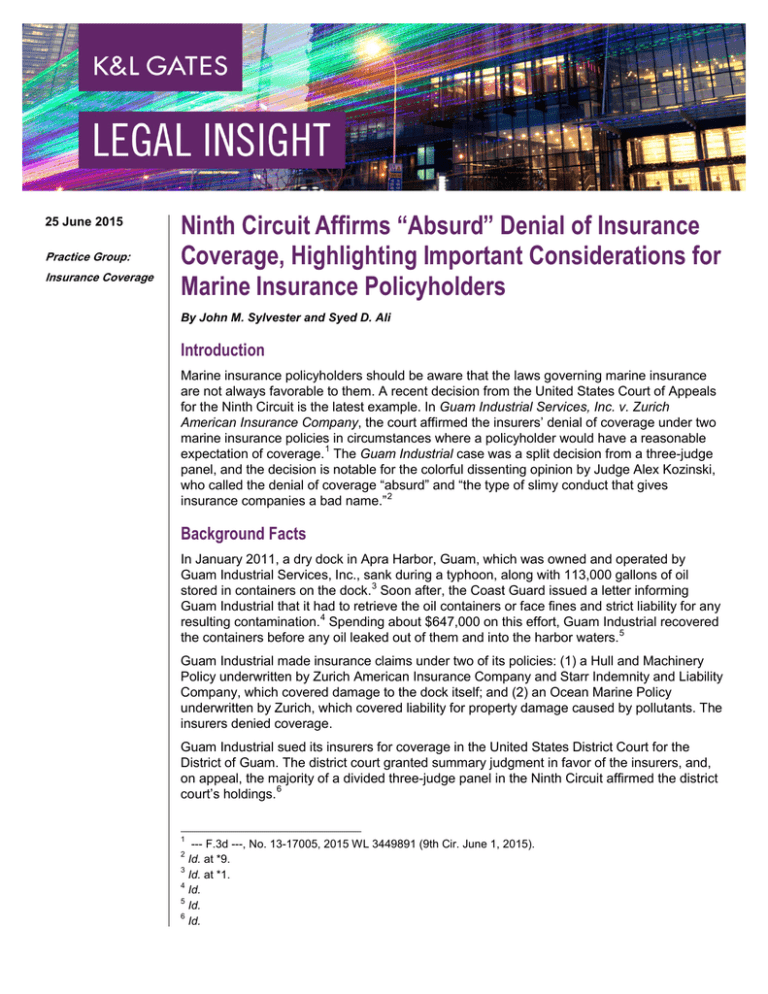
25 June 2015 Practice Group: Insurance Coverage Ninth Circuit Affirms “Absurd” Denial of Insurance Coverage, Highlighting Important Considerations for Marine Insurance Policyholders By John M. Sylvester and Syed D. Ali Introduction Marine insurance policyholders should be aware that the laws governing marine insurance are not always favorable to them. A recent decision from the United States Court of Appeals for the Ninth Circuit is the latest example. In Guam Industrial Services, Inc. v. Zurich American Insurance Company, the court affirmed the insurers’ denial of coverage under two marine insurance policies in circumstances where a policyholder would have a reasonable expectation of coverage. 1 The Guam Industrial case was a split decision from a three-judge panel, and the decision is notable for the colorful dissenting opinion by Judge Alex Kozinski, who called the denial of coverage “absurd” and “the type of slimy conduct that gives insurance companies a bad name.” 2 Background Facts In January 2011, a dry dock in Apra Harbor, Guam, which was owned and operated by Guam Industrial Services, Inc., sank during a typhoon, along with 113,000 gallons of oil stored in containers on the dock.3 Soon after, the Coast Guard issued a letter informing Guam Industrial that it had to retrieve the oil containers or face fines and strict liability for any resulting contamination.4 Spending about $647,000 on this effort, Guam Industrial recovered the containers before any oil leaked out of them and into the harbor waters. 5 Guam Industrial made insurance claims under two of its policies: (1) a Hull and Machinery Policy underwritten by Zurich American Insurance Company and Starr Indemnity and Liability Company, which covered damage to the dock itself; and (2) an Ocean Marine Policy underwritten by Zurich, which covered liability for property damage caused by pollutants. The insurers denied coverage. Guam Industrial sued its insurers for coverage in the United States District Court for the District of Guam. The district court granted summary judgment in favor of the insurers, and, on appeal, the majority of a divided three-judge panel in the Ninth Circuit affirmed the district court’s holdings. 6 1 --- F.3d ---, No. 13-17005, 2015 WL 3449891 (9th Cir. June 1, 2015). Id. at *9. 3 Id. at *1. 4 Id. 5 Id. 6 Id. 2 Ninth Circuit Affirms “Absurd” Denial of Insurance Coverage, Highlighting Important Considerations for Marine Insurance Policyholders The Hull and Machinery Policy Guam Industrial purchased its Hull and Machinery Policy to cover damages to its dry dock.7 A warranty in that policy required Guam Industrial to obtain and maintain Navy certification for the dock, which would ensure that it had the requisite structural integrity. 8 But Guam Industrial never obtained Navy certification; instead, it obtained “commercial” certification.9 That certification expired near the end of 2010, and the certification company refused to renew it unless certain repairs to the dock were made. 10 A few months later, while undergoing those repairs, the dock sank during the typhoon. 11 Zurich and Starr denied Guam Industrial’s insurance claim for damages to the dock, based on Guam Industrial’s alleged breach of the certification warranty. Under federal maritime law and many states’ laws, express warranties in marine insurance contracts may be strictly construed, which means that any breach of the warranties will release the insurer from coverage liability even if the breach is unrelated to the loss. 12 This rule was developed many years ago “because of the ‘recognition that it is peculiarly difficult for marine insurers to assess their risk, such that insurers must rely on the . . . warranties made by insureds regarding their vessels’ condition and usage.’”13 The district court granted summary judgment to the insurers under this strict rule of law. On appeal, the Ninth Circuit held that the certification warranty should be strictly construed, regardless of whether state or federal law applies, because it found there is no conflict between the two. 14 While authorities support the application of this strict legal rule under maritime law, no court in Guam had yet considered it. 15 The Ninth Circuit concluded that the Supreme Court of Guam would likely follow the “majority rule” since Guam’s insurance statutes were derived from California law, which requires strict compliance with material warranties.16 But the court never discussed the reason underlying this rule, and whether it really has any place in the modern world. Given the advances in technology, it is highly questionable whether there remain any “peculiar difficulties” for marine insurers in assessing their risk.17 Before predicting whether the Supreme Court of Guam would adopt a strict application of this rule, the Ninth Circuit should have considered whether there is any practical reason for doing so. Yet there was no such consideration by the court. Rather, applying this strict rule to the facts of this case, the court held that because “there is no question that Guam Industrial failed to comply with the Navy Certification warranty,” the 7 Id. at *3. Id. at *1. 9 Id. 10 Id. 11 Id. 12 See, e.g., Lexington Ins. Co. v. Cooke’s Seafood, 835 F.2d 1364, 1366 (11th Cir. 1988); Yu v. Albany Ins. Co., 281 F.3d 803, 808–10 (9th Cir. 2002). But see Albany Ins. Co. v. Anh Thi Kieu, 927 F.2d 882, 892 (5th Cir. 1991) (applying a Texas statute to require a causal connection between a breach of an express warranty and a loss). 13 Yu, 281 F.3d at 809 (quoting Commercial Union Ins. Co. v. Flagship Marine Servs., Inc., 190 F.3d 26, 31– 32 (2d Cir. 1999)). 14 Guam Indus., 2015 WL 3449891, at **2–3. 15 Id. 16 Id. at *3. 17 Yu, 281 F.3d at 809 (quoting Commercial Union Ins. Co., 190 F.3d at 31–32). 8 2 Ninth Circuit Affirms “Absurd” Denial of Insurance Coverage, Highlighting Important Considerations for Marine Insurance Policyholders insurers may escape their coverage obligations without showing any causal connection between the breach of warranty and the sinking of the dock.18 The Ocean Marine Policy One of the reasons Guam Industrial purchased its Ocean Marine Policy was to cover the risk that “something nasty would get into the water and Guam Industrial would be under a legal obligation to clean it up.” 19 That is exactly what happened here. Yet Zurich denied coverage. The policy specifically provided coverage for “claims ‘arising out of the discharge, dispersal, release or escape of . . . oil . . . or pollutants into or upon . . . any watercourse or body of water.’” 20 While containers of oil plunged into the harbor, no oil leaked out of the containers, so the majority found that “it is clear that barrels or containers were discharged, dispersed, and released, but that oil was not.” 21 The court held that sealed barrels, regardless of their contents, do not qualify as pollutants under the plain meaning of the policy. 22 But, as Judge Kozinski’s dissent points out, if the barrels or containers were discharged, dispersed, or released from the dry dock, then so were their contents. 23 “[W]e’re not talking here about empty barrels; we’re talking about barrels filled with a known pollutant. Nor are we talking about indestructible barrels—something that exists only in graphic novels. In the real world, barrels are merely temporary containment devices that will corrode or break over time. At that point, whatever lurks inside—oil, acid, arsenic, radioactive waste, you name it— will spill out.” 24 The dissent raised a valid point. And the Coast Guard seemed to agree, which is why it directed Guam Industrial to remove the containers from the harbor. The majority’s holding here puts policyholders in an awkward position when containers full of known pollutants are submerged into the water because they may now have an incentive to delay cleanup until some of the pollutants actually escape from the containers into the water, or perhaps to be less careful when retrieving the containers from the water. The fact is that “[t]he cost of fishing out submerged oil barrels at the command of the Coast Guard is the kind of risk for which dry dock owners would seek coverage when buying insurance. It doesn’t matter whether oil mixes with water immediately or sometime later; the risk is the same.”25 By making that distinction matter for coverage purposes, the Ninth Circuit ignored important practical considerations. Simply put, public policy should support coverage in these circumstances, and, as Judge Kozinski’s dissent points out, the ambiguous language in the policy should have been interpreted in favor of coverage for the policyholder. 18 Guam Indus., 2015 WL 3449891, at *3. Id. at *6. 20 Id. at *3. 21 Id. at *4. 22 Id. 23 Id. at *6. 24 Id. at *7. 25 Id. at *8. 19 3 Ninth Circuit Affirms “Absurd” Denial of Insurance Coverage, Highlighting Important Considerations for Marine Insurance Policyholders Takeaways from the Decision This decision should serve as a reminder to marine insurance policyholders that, historically, the laws governing marine insurance provide insurers with numerous ways to avoid coverage obligations under their policies. As demonstrated here, insurers may deny coverage for an alleged breach of a warranty—even if that breach is unrelated to the loss or the cause of the loss. This rule gives insurers an incentive to search for alleged breaches of warranty any time a loss arises. Therefore, policyholders should be vigilant about trying to act consistently with all warranties in their policies. Finally, marine policyholders should carefully review any grants of pollution coverage in their policies and attempt to eliminate any loopholes in the coverage-granting language that insurers may seize upon in an attempt to avoid providing coverage. Authors: John M. Sylvester john.sylvester@klgates.com +1.412.355.8617 Syed D. Ali syed.ali@klgates.com +1.412.355.6229 Anchorage Austin Beijing Berlin Boston Brisbane Brussels Charleston Charlotte Chicago Dallas Doha Dubai Fort Worth Frankfurt Harrisburg Hong Kong Houston London Los Angeles Melbourne Miami Milan Moscow Newark New York Orange County Palo Alto Paris Perth Pittsburgh Portland Raleigh Research Triangle Park San Francisco São Paulo Seattle Seoul Shanghai Singapore Spokane Sydney Taipei Tokyo Warsaw Washington, D.C. Wilmington K&L Gates comprises more than 2,000 lawyers globally who practice in fully integrated offices located on five continents. The firm represents leading multinational corporations, growth and middle-market companies, capital markets participants and entrepreneurs in every major industry group as well as public sector entities, educational institutions, philanthropic organizations and individuals. For more information about K&L Gates or its locations, practices and registrations, visit www.klgates.com. This publication is for informational purposes and does not contain or convey legal advice. The information herein should not be used or relied upon in regard to any particular facts or circumstances without first consulting a lawyer. © 2015 K&L Gates LLP. All Rights Reserved. 4
